
The Doge's Palace is a palace built in Venetian Gothic style, and one of the main landmarks of the city of Venice in northern Italy. The palace included government offices, a jail, and the residence of the Doge of Venice, the elected authority of the former Republic of Venice. It was originally built in 810, rebuilt in 1340 and extended and modified in the following centuries. It became a museum in 1923 and is one of the 11 museums run by the Fondazione Musei Civici di Venezia.
Andrea di Robilant is an Italian journalist and writer.

The Grand Canal is the largest channel in Venice, Italy, forming one of the major water-traffic corridors in the city.

The Basilica dei Santi Giovanni e Paolo, known in Venetian as San Zanipolo, is a Catholic minor basilica and Dominican conventual church in the Castello sestiere of Venice, Italy.
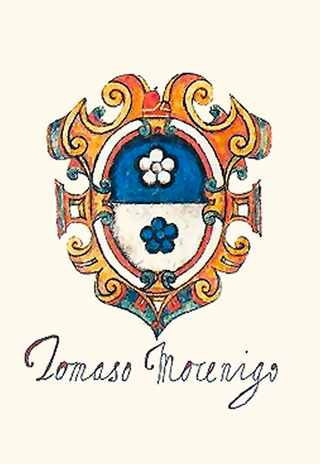
The House of Mocenigo was a Venetian noble family of Lombard origin. Many of its members were doges, statesmen, and soldiers.
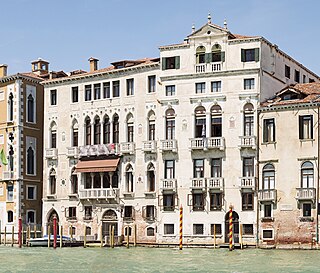
The Palazzi Barbaro—also known as Palazzo Barbaro, Ca' Barbaro, and Palazzo Barbaro-Curtis—are a pair of adjoining palaces, in the San Marco district of Venice, northern Italy. They were formerly one of the homes of the patrician Barbaro family. The Palazzi are located on the Grand Canal of Venice, next to the Palazzo Cavalli-Franchetti and not far from the Ponte dell'Accademia. The buildings are also known as the Palazzo Barbaro-Curtis. It is one of the least altered of the Gothic palaces of Venice.

Alvise Sebastiano Mocenigo (1662–1732), sometimes enumerated Alvise III Mocenigo, was the 112th Doge of Venice from 1722 to 1732. He was also Provveditore Generale (Governor) of Venetian Dalmatia twice.

The Coinage of the Republic of Venice include the coins produced by the Republic of Venice from the late 12th century to 1866. After this date, coins were still produced in Venice.

The Museo di Palazzo Mocenigo is a palazzo near the Church of San Stae, south of the Grand Canal in the sestiere of Santa Croce in Venice, Italy. It is now a museum of fabrics and costumes, run by the Fondazione Musei Civici di Venezia.
Palazzo Mocenigo may be one of the following palazzos in Venice, Italy, named after the Mocenigo family, seven of whom were Doges of Venice:

The Palazzi Mocenigo consist of the following complex of palazzos on the Grand Canal in Venice, Italy:

The Palazzo Mocenigo Casa Nuova is a palazzo on the Grand Canal in the sestiere of San Marco, Venice, Italy. The palazzo is located between the Rialto Bridge and St Mark's Square. The original Palazzo Mocenigo consisted four different buildings built for the Mocenigo family, seven of whom were Doges of Venice. Other Palazzi Mocenigo include the Palazzo Mocenigo Casa Vecchia and the Palazzo Mocenigo, forming a building complex designed for entertainment.

The Palazzo Mocenigo Casa Vecchia is a palazzo on the Grand Canal in the sestiere of San Marco, Venice, Italy.
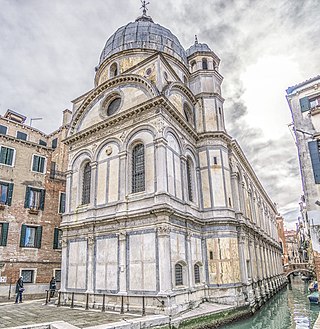
Venetian Renaissance architecture began rather later than in Florence, not really before the 1480s, and throughout the period mostly relied on architects imported from elsewhere in Italy. The city was very rich during the period, and prone to fires, so there was a large amount of building going on most of the time, and at least the facades of Venetian buildings were often particularly luxuriantly ornamented.
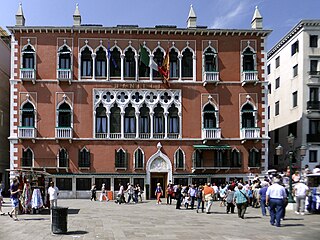
The Hotel Danieli is a palatial five-star hotel in Venice, Italy. The central wing of the hotel was built as the Palazzo Dandolo at the end of the 14th century, by one of the Dandolo families. CNN cites it as one of the top five "lavish hotels" in the city.
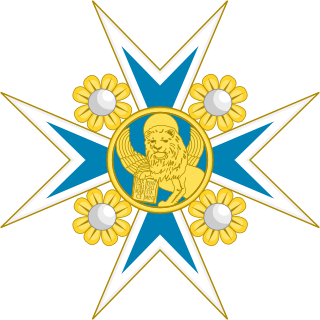
The Order of Saint Mark was the sole order of chivalry of the Republic of Venice. It was named in honour of Venice's patron saint, Mark the Evangelist.
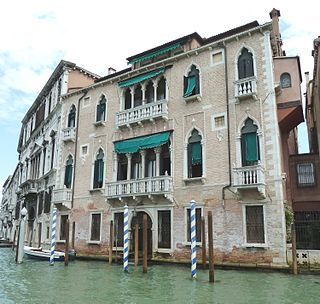
Palazzo Erizzo Nani Mocenigo is a palace in Venice located in the San Marco district and overlooking the Grand Canal between Palazzo Da Lezze and Palazzo Contarini delle Figure.
This is an alphabetical index of people, places, things, and concepts related to or originating from the Republic of Venice. Feel free to add more, and create missing pages.
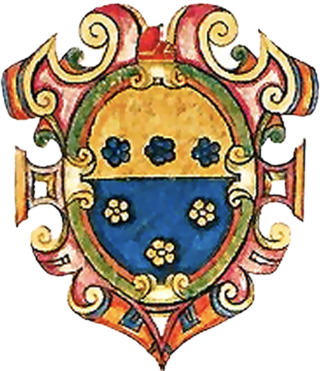
The House of Loredan-Santo Stefano was a cadet branch of the House of Loredan that existed from the 14th century until 1767. The branch was mainly settled in the Palazzo Loredan in Campo Santo Stefano, which they acquired in 1536 from the Mocenigo family. The progenitor of the branch is considered to be Gerolamo Loredan "dal Barbaro" di S. Vitale (d.~1474), father of Doge Leonardo Loredan and Dogaressa Caterina Loredan. Besides Leonardo, the branch also gave Doge Francesco Loredan.
















